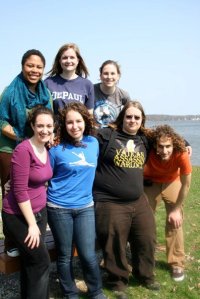
—
This is the first article in a several part series throughout this quarter, written by Nic Cable, focusing on the complexities of interfaith work in higher education. These articles are in conjunction with an academic independent study project on the same themes.
—
This past weekend, nearly 30 DePaul University students gathered together to take part in the second annual Interfaith Retreat. This year the theme was love. However, it was not love in some abstract notion of the word; rather, the goal was to begin to analyze it in light of our particular religious identities regarding what it means to love oneself (inward), to love one another (outward), and to love our particular idea(s) of the divine (awkward). This multilevel approach to love was the basis through which we grew in community together last weekend, and it is in the spirit of last weekend that I am drawn to reflect on my relationship to love, but also to the entire interfaith movement.My experiences with interfaith work at DePaul are nearing their second birthday. I have grown as an interfaith leader while, simultaneously, the interfaith work at this institution has blossomed, increasing in both quality and quantity of programs. This trip seemed to be a culminating experience in ways of how far we have come in the past two years. To understand how far we have come it is important to understand where we stand today.
The Interfaith Retreat (or LoveFest 2011) embodied the spirit of not only DePaul University, but also the interfaith youth movement, which is gearing up throughout this country. There were representatives from numerous religious groups on campus, students with both strong affiliations, no affiliations, and affiliations that are in a state of flux. However, regardless of affiliation or lack thereof, students all came with a genuine interest to learn about the diversity of religious experience in the lives of their fellow students. This is a typical longing of young people in this country, especially as the increase of religious diversity and religious practice break through into dominant culture, media, and discourse. The goal of interfaith leaders is cultivating an environment suitable for fostering such dialogue and relationship building.
The planning committee for the retreat was phenomenal in their attempt to take every precaution in creating a safe space where people could be themselves, learn from one another, and grow as individuals and as a community. We do this back at DePaul, as well. Mainly through our weekly Interfaith Cafe, which is coordinated by Bridget Liddell, we seek to give space for growth and community building. This is not to say that it is always easy; sometimes this can be quite difficult. Some factors that are difficult is sustaining a community of individuals. By this, I mean students have very complex schedules that are always shifting. In the midst of this, how do we expect to achieve a stable community? This is the burden of any community organizing, in college or anytime.
I think that LoveFest shared a remedy to this struggle we face in mobilizing young people to participate in the interfaith movement. It begins with Love and it is shaped by Love. Love is a truth present in all faith traditions and cultures throughout time. It is this love that draws us together to bring out the best in one another. Without this love, we would not be driven to do justice or to take care of our families and loved ones. Learning to love ourselves, one another, and perhaps something greater than ourselves is critical to forming a safe space in our hearts and in this world where the beautiful and necessary work of interfaith cooperation can begin.
So, we must continue to love, continue to come together as people of diverse backgrounds, but with one shared hope for the future: peace. We can do this together. But first, we must reflect and think about the work we do and love, and the way we can make it more sustainable and inviting for all whose hearts are open.